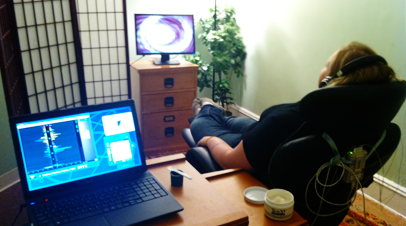Our team of psychologists
Camilla Barbini
Thèse de doctorat
The multimodal approach of neurofeedback in the care of Attention Deficit Hyperactivity Disorder.
+33 (0)9 82 51 60 13
Florent Viard
Doctor in Clinical Psychology
EMDR in the evolution of post traumatic stress disorder management
+33 (0)9 82 51 60 13
Innovative and effective techniques
EMDR
Particularly effective in treating post-traumatic stress disorder
Neurofeedback
Learning to master his cognitive activity, and more specifically his attention
Cognitive Assessment
WISC (test of intellectual quotient for the child) and WAIS (test of intellectual for the adult)
EMDR
Eyes Movement And Reprocessing
EMDR is a psychotherapy recommended by the WHO (World Health Organization) and the HAS (High Authority for Health) in the treatment of post-traumatic stress disorder. EMDR can take care of all people whose suffering can be caused or potentiated by life-threatening experiences or anxiety.
EMDR works on the regulation of stress and emotions by means of a neurophysiological mechanism activated by the protocol of the session validated scientifically. The first therapeutic effects are then detected from the first sessions and the benefits are targeted over the long term.
- Post Traumatic Stress Condition
- Depressions
- Anxiety Disorders
- Addictions
- Sexuality disorders

The neurofeedback
Currently in the development phase, this new protocol could be proposed to the Center by the end of 2017.
Neurofeedback is a proposed approach to the management of Attention Deficit Hyperactivity Disorder (ADHD), based on the acquisition of regulatory strategies that allow the subject to learn to master his or her cognitive activity, Warning. The standard protocol, called unimodal and focused on attention, has already proved its worth and demonstrated an effectiveness similar to that of drug therapy. New research is interested in a multimodal version: the interest is to increase the long-term beneficial effects by considering all the disorders present in ADHD, namely attention deficit but also hyperactivity.
Cognitive Assessments
The WISC (intellectual test for the child) and the WAIS (intellectual test for adults) are used in the case of an assessment of intellectual abilities.
- Provide quantitative and objective information on the intellectual capacities of the subject who passes the balance sheet
- Define accompaniment and follow-up according to the results obtained in these balances, but also the patient\'s demand.

